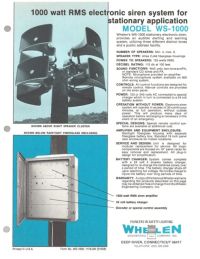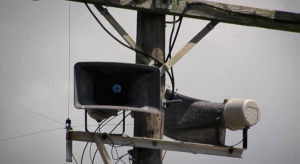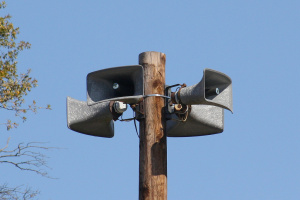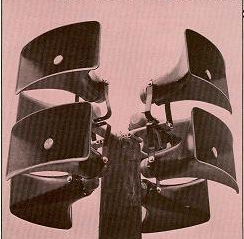WS-1000: Difference between revisions
No edit summary |
ArxCyberwolf (talk | contribs) m (ArxCyberwolf moved page Whelen WS-1000 to WS-1000) |
||
| (10 intermediate revisions by 3 users not shown) | |||
| Line 1: | Line 1: | ||
{{Infobox siren | {{Infobox siren|title=Whelen WS-1000|image=WS1000advertisement.jpeg|caption=A 1970s advertisement for the WS-1000-8.|company=[[Whelen Engineering]]|produced=1977-1979|type=[[Directional]] [[Electronic]]|output=112 dB @ 100 feet|wattage=600-1200 W|voltage=24|current=DC|succeeded=[[Whelen WS-2000]]|sheet=https://drive.google.com/file/d/11nuk3EgVBfRZcz6IZoN0uOJScdcNu_fo/view?usp=sharing|manual=N/A}}The '''WS-1000''' is a basic directional electronic speaker array siren that was created by [[Whelen Engineering]] in the late 1970s and was Whelen's first siren created for the outdoor warning siren market. While revolutionary for its time, it didn't sell well and was replaced by the superior [[Whelen WS-2000|WS-2000]] a few years later, which proved to be a great success. | ||
|image= | |||
|company= [[Whelen Engineering]] | == History and design == | ||
|produced = 1977-1979 | The WS-1000 is about as basic as an electronic siren can be. The siren consists of Atlas CJ46 fiberglass paging horns, powered by 125 W high-power speaker drivers. Up to 8 of these horns are supported per controller, with 4 and 8 horns being the most common configurations. These allow the siren to reach 112 dB at 100 ft according to Whelen's advertisements, although it's unknown whether this is for the 4 or 8 horn model. The horn mounts are designed to be attached to the side of a utility pole and are on swivels which allow the horns to be faced in whichever direction they are needed. | ||
|type = [[Electronic]] | |||
| | A small cap covers the drivers and protects them from the elements. The WS-1000 came stock with an early analog controller, which was revolutionary for the time of having battery backup capabilities and was the first on the market to do so. This early controller was capable of wail, yelp, and hi-lo, as well as voice functionalities. These were likely based on Whelen's existing vehicular siren controllers, as Whelen was already well-established in that market. | ||
| | |||
|succeeded=[[ WS- | The WS-1000 is fully capable of using newer controllers such as the ESC-864, and units using these newer controllers are referred to as WPS-1000s. Due to the popularity of the Atlas CJ-46 horns for non-siren use, similar-looking arrays can be found all across the country. The horns are commonly used as electronic church carillon bells, which leads to much confusion from enthusiasts who believe they are WS-1000 units. They can also easily be confused with the Loudoun [[Loudoun Emergency Warning Sirens|ES-1000]]. | ||
|sheet = | |||
The WS-1000, while revolutionary for its time, did not sell very well as the potential for electronic sirens had not been proven yet. The design was also rather basic, and the controller left much to be desired. Whelen would later improve upon the design in 1979, leading to the release of the [[Whelen WS-2000|WS-2000]] series and the discontinuation of the WS-1000 the same year. Today, a handful of units remain in service, all equipped with newer controllers to improve the lifespan of the sirens. | |||
== History == | |||
The | |||
The WS-1000 | |||
WS-1000 | |||
WS-1000 series | |||
== Variants == | == Variants == | ||
The WS-1000 series came in 4 known variants | The WS-1000 series came in 4 known variants: | ||
{| class="wikitable" | {| class="wikitable" | ||
!Model !! Image !! Output dBc !! Drivers | !Model !! Image !! Output dBc !! Drivers | ||
|-align="center" | |-align="center" | ||
! WS-1000-2 (Custom) | ! WS-1000-2 (Custom) | ||
| [[File:WS-1002.png|300px|]] || | | [[File:WS-1002.png|300px|]] || 103 || 2x125W | ||
|-align="center" | |-align="center" | ||
! WS-1000-4 | ! WS-1000-4 | ||
| Line 39: | Line 35: | ||
[[Category:Sirens]][[Category:Electronic Sirens]][[Category: | [[Category:Sirens]][[Category:Electronic Sirens]] | ||
[[Category:Whelen Engineering]] | |||
[[Category:Directional Sirens]] | |||
__INDEX__ | |||
Latest revision as of 21:21, 24 October 2024
| Whelen WS-1000 | |
 A 1970s advertisement for the WS-1000-8. | |
| Company | Whelen Engineering |
|---|---|
| Produced | 1977-1979 |
| Type | Directional Electronic |
| Sound output | 112 dB @ 100 feet |
| Wattage | 600-1200 W |
| Voltage | 24 V DC |
| Succeeded by | Whelen WS-2000 |
| Documentation | [N/A Manual] Product sheet |
The WS-1000 is a basic directional electronic speaker array siren that was created by Whelen Engineering in the late 1970s and was Whelen's first siren created for the outdoor warning siren market. While revolutionary for its time, it didn't sell well and was replaced by the superior WS-2000 a few years later, which proved to be a great success.
History and design
The WS-1000 is about as basic as an electronic siren can be. The siren consists of Atlas CJ46 fiberglass paging horns, powered by 125 W high-power speaker drivers. Up to 8 of these horns are supported per controller, with 4 and 8 horns being the most common configurations. These allow the siren to reach 112 dB at 100 ft according to Whelen's advertisements, although it's unknown whether this is for the 4 or 8 horn model. The horn mounts are designed to be attached to the side of a utility pole and are on swivels which allow the horns to be faced in whichever direction they are needed.
A small cap covers the drivers and protects them from the elements. The WS-1000 came stock with an early analog controller, which was revolutionary for the time of having battery backup capabilities and was the first on the market to do so. This early controller was capable of wail, yelp, and hi-lo, as well as voice functionalities. These were likely based on Whelen's existing vehicular siren controllers, as Whelen was already well-established in that market.
The WS-1000 is fully capable of using newer controllers such as the ESC-864, and units using these newer controllers are referred to as WPS-1000s. Due to the popularity of the Atlas CJ-46 horns for non-siren use, similar-looking arrays can be found all across the country. The horns are commonly used as electronic church carillon bells, which leads to much confusion from enthusiasts who believe they are WS-1000 units. They can also easily be confused with the Loudoun ES-1000.
The WS-1000, while revolutionary for its time, did not sell very well as the potential for electronic sirens had not been proven yet. The design was also rather basic, and the controller left much to be desired. Whelen would later improve upon the design in 1979, leading to the release of the WS-2000 series and the discontinuation of the WS-1000 the same year. Today, a handful of units remain in service, all equipped with newer controllers to improve the lifespan of the sirens.
Variants
The WS-1000 series came in 4 known variants:
| Model | Image | Output dBc | Drivers |
|---|---|---|---|
| WS-1000-2 (Custom) |  |
103 | 2x125W |
| WS-1000-4 |  |
106 | 4x125W |
| WS-1000-6 | 109 | 8x125W | |
| WS-1000-8 |  |
112 | 8x125W |